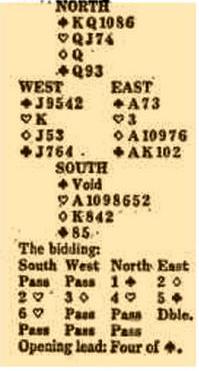![]() by Charles H Goren, Omar Sharif 4 Dec 11, 1979
by Charles H Goren, Omar Sharif 4 Dec 11, 1979
Neither vulnerable. South deals.
When the opponents freely bid to slam, you seldom double just to increase the penalty, if they know what they are doing, you will lose more in the long run than you stand to gain.
Most experts, therefore, double a slam to suggest that an unusual lead, usually the first suit bid by dummy, is required to beat the contract. This double is known in the trade as a Lightner double. However, they might change their minds after they learn of this hand from the Cavendish In- vitational Pairs, reported by Eric Kokish of Montreal.
This does not look like the sort of bidding you would expect from the field in one of the strongest events in this part of the world. We have no idea what North was doing, but South’s slam bid was not an unreasonable gamble. It seemed likely that his partner was void in diamonds, so a slam would have a chance. Also, there was the possibility that the opponents would not allow six hearts to play, and that they might be talked into a phantom sacrifice. East did what you and we would have done-he expected to defeat six hearts, regardless of the lead.

If West had led a trump, a diamond or a club, this article would never have been writ- ten. But West «knew» that his partner wasn’t doubling just to increase the penalty. The double had to be of the Lightner variety, requesting the lead of dummy s first-bid suit. So he dutifully led a spade.
Declarer called for the ten of spades from dummy, and ruffed away East’s ace. Since there was no quick entry to dummy to take the trump finesse, declarer had no trouble guessing that suit -he banged down the ace, felling the king.’
The rest was easy. Declarer entered dummy with a trump and discarded two clubs on the king-queen of spades. He was delighted to concede a diamond trick and score 1,210 for making six hearts doubled.
